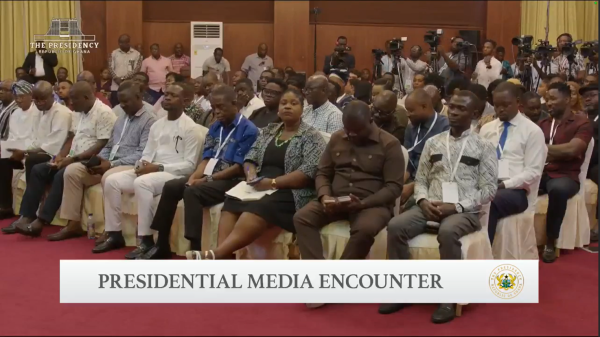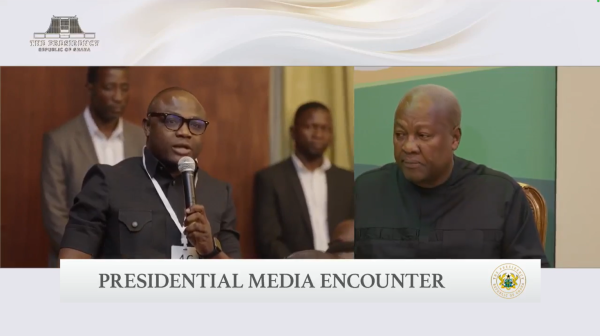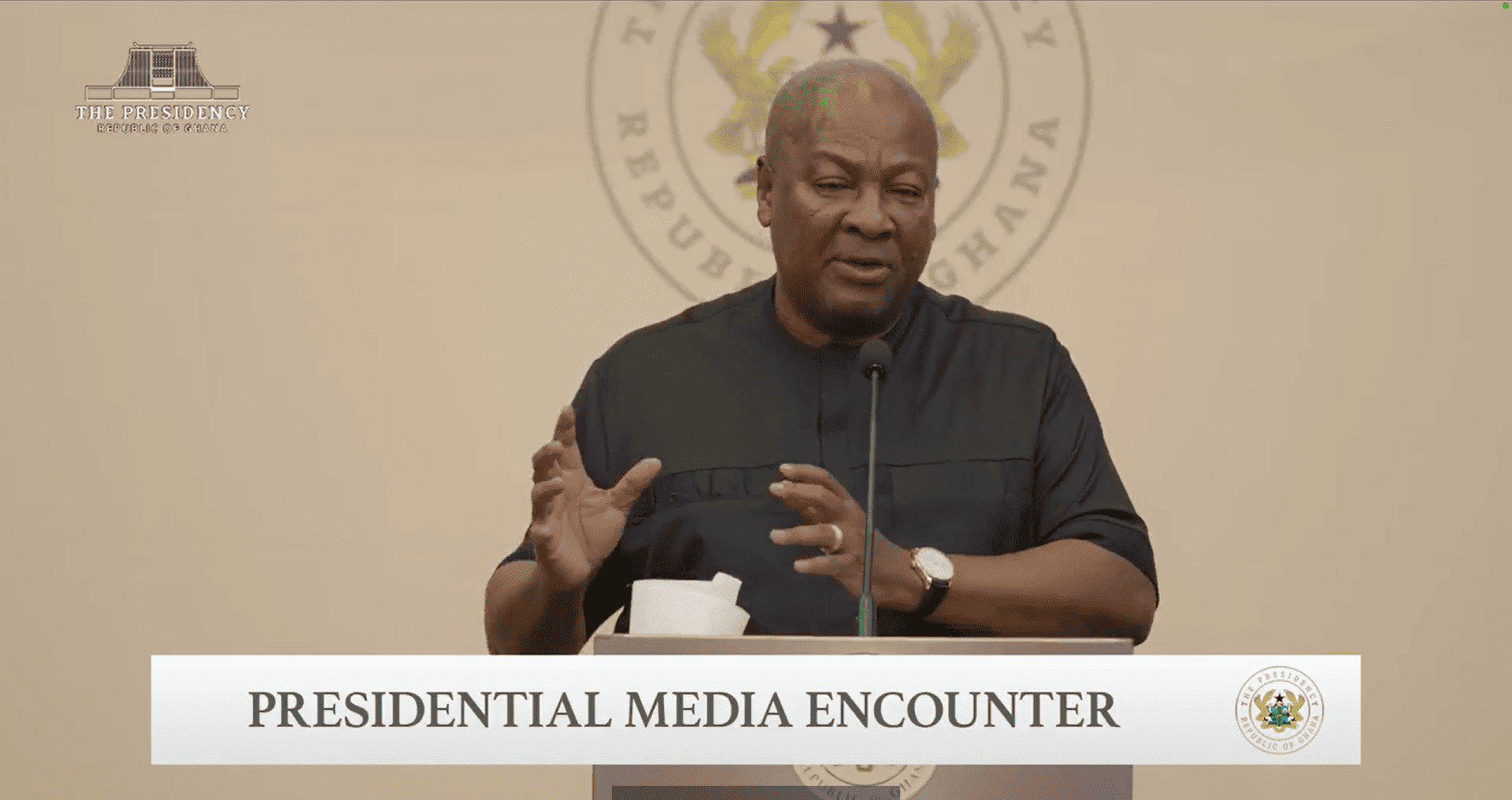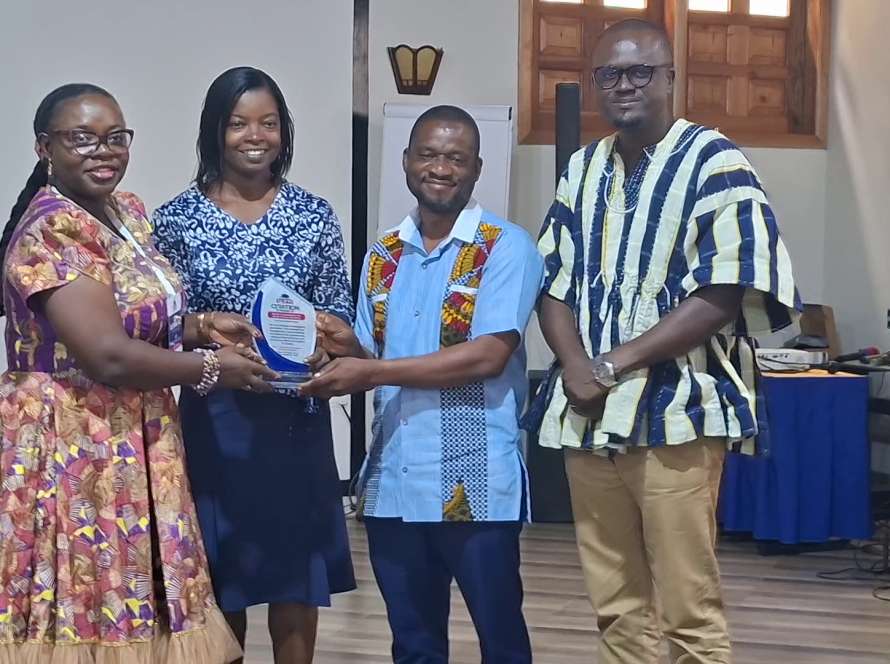President John Dramani Mahama hosted journalists at the Jubilee House, the seat of government, to respond to questions on the state of affairs in the country and the performance of his government on September 10, 2025.
The event, known as the “Presidential Media Encounter,” is a major highlight for journalists, who use the opportunity to demand accountability from the president. Sadly, the event has not been held by the presidency for the past six years.
In the eight-year rule of former President Akufo-Addo, the event was held only four times, despite his promise in January 2018 that he would commit to hosting journalists at least twice a year.
The Media Foundation for West Africa (MFWA) considers the engagement a crucial exercise that deepens the principles of transparency and accountability, which are key tenets in democratic governance. We, therefore, commend the President and the government for maintaining the culture of open and regular media encounters. We hope that President Mahama will sustain the presidential media encounter event throughout his tenure.
To help guide post-event reflections and to provide useful insights for future engagements, the MFWA presents its perspective on the media encounter. The analysis presented here assesses the overall arrangement and format of the event, the quality of the questions asked and the performance of the President. The organisation also makes recommendations for future encounters.
Format of the Event
Overall the event was well organised based on what was broadcast on TV. The event started on time and was orderly, which is commendable. The MFWA also observed the presidency’s laudable efforts in providing opportunities for journalists from other regions to participate virtually.
While it is a matter of protocol for the president to welcome and address the press with updates about his governance, the opening speech was relatively long. President Mahama’s introductory remarks lasted 28 minutes, which represents about 22 per cent of his two-hour encounter with the press.
There were 25 journalists who were offered opportunities to ask questions. Only seven of them were women, representing 28 per cent. This raises concerns about gender balance.

The MFWA also observed that the broadcast was not accessible to persons with hearing impairment as there was no sign language interpretation even by the state broadcaster.
Quality of Questions Asked
In all, the 25 journalists who were offered the opportunity asked 31 questions. This is an improvement from the previous event in December 2019 when 23 journalists asked 26 questions.
Generally, most of the journalists appeared well-prepared and asked relevant questions with good background. The questions covered themes that are currently pertinent to development and good governance. The MFWA counted eight (8) broad themes:
Media & Press Freedom
Economy, Finance & Trade
Energy, Utilities & Housing
Governance, Accountability & Corruption
Security, Peace & National Unity
Galamsey & Environment
Infrastructure & Development
Sports, Creative Arts, Tourism & Youth Employment
However, the MFWA observed the absence of questions on some key sectors such as:
-Health
-Food and Agriculture
-Education
-Sanitation
The MFWA also analysed the quality of the questions based on basic principles such as: relevance, clarity, good background and contextualisation, references to data, facts, illustrations; and whether the questions are close-ended or open-ended.
Using these principles, the MFWA found the following questions outstanding:
- “We are told democracy thrives on checks and balances and separation of powers. Your party has a two third majority in Parliament. The Chief Justice you came to meet has been removed, of course under your hand, although the process was gone through. There is talk of the EC Chair and the leadership “not being fit for purpose”. Some people fear that these developments and others create a situation where the other arms of government are completely subservient to the executive. In fact, one newspaper expressed the fear that you could be morphing into “a supreme leader”. There is a maxim that power corrupts and absolute power corrupts absolutely. Should we be worried in your legacy term that the democracy you came to meet will be well oiled and that the three arms of government will work not in subservience but in unison?” – Bernard Avle (Citi FM/Channel 1 TV)
-The question has a good background and is relevant in regards to concerns about checks and balances in governance.
“Mr. President in your speech, you mentioned that you are committed to resetting institutions. But there are many Ghanaians watching us tonight, who are either on the verge of homelessness or struggling to get money to rent, not because they don’t have money, but because we are not sticking to our rent laws.
I just want to ask when your reset agenda will reach the housing sector. Particularly for the State Housing Company Limited in putting up real affordable homes for many Ghanaians and the rent control Department in protecting vulnerable Ghanaians.” – Bernice Abu-Baidoo Lansah, GHOne TV
-The question is very clear and captures the housing challenges of many Ghanaians.
“Mr. President, you’ve already talked about how important it is to save our water bodies and forest reserves. But over the past nine months since you became President, turbidity levels in the water bodies have worsened, according to the Water Resources Commission. The Ghana Water Company supports this, saying they’ve had to shut down several treatment plants because the water sources are too polluted for them to process. Besides that, we know that there have been increased incursions into forest reserves for galamsey. We’ve also heard from your transport Minister that we are importing more excavators than ever before, over 200 a day. My question [relates] to its [galamsey’s] effect on the economy. Recently, the Finance Minister has been touting the work of the GoldBod, led by Sammy Gyamfi for being an anchor to the economy, especially when it comes to stabilising the cedi. My question is, does your government know [or] is your government able to tell the difference between gold from galamsey and gold from regular concessions when the GoldBod board is buying gold from local producers? And could it be [that], because so much of it comes from galamsey, could that be the reason why we are seeing some reluctance recently in the fight against galamsey, in the sense that the IGP’s efforts have been stopped and he has brought back his men from the forests?”– Kojo Yankson, Joy FM
Other observations
-The question about the mediation efforts on the ethnic conflict in Savannah region that has resulted in the death of over 30 Ghanaians and displacement of thousands was very relevant. However, the questioner, Mahama Haruna of Nkilgi FM, spent too much time winding around with the background and almost missed the opportunity to drop the important question.
– The most dominant theme from the questions was on the issue of illegal mining (galamsey). This emphasised the media’s interest in and relevance of the environmental menace to the country.
The President’s performance
Overall, the President was composed and demonstrated knowledge on the issues raised.
His commitment to promoting press freedom and protecting journalists is reassuring. His calls for the security agencies to be enlightened about the work of journalists to avoid attacks is commendable.
The president appeared candid. When asked whether his government had “manipulated” the cedi against other major foreign currencies, he seemed frank in his response, indicating that the Bank of Ghana indeed intervened in restoring the currency.

On the other hand, despite speaking for 28 minutes, the president’s opening remarks failed to address the critical security issues in Bawku and Gbenyiri. This is disappointing given the number of citizens displaced and the lives lost to the conflicts.
On the question about transforming into a supreme leader and the independence of the various arms of government, the president’s response addressed his commitment to democracy but did not respond to concerns about the possibility of removing the EC Chairperson.
Recommendations
- The president should minimise the time used for his introductory remarks to allow more time for the question-and-answer session.
- Future encounters should make use of sign-language interpreters to be inclusive of hearing-impaired citizens.
- In the future, the selection of journalists to pose questions should consider gender balance and inclusivity.
- We urge the President to keep his promise of meeting the media regularly.






